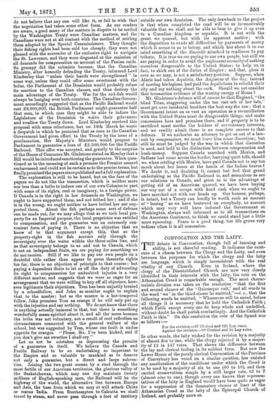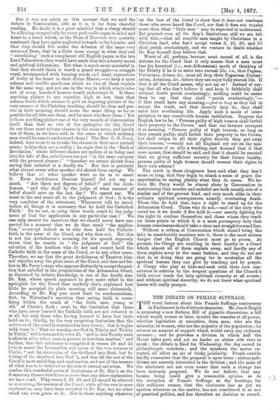CONVOCATION AND THE LAITY.
THE debate in Convocation, though full of learning and ability, is not cheerful reading. It indicates the exist- ence of a chasm between the Clergy and the Laity, and even between the purposes for which the clergy and the laity use language, which is simply inconsistent with the real vitality of any Church. Even in Ireland, where the clergy of the Disestablished Church are now very closely identified in their interests with the laity, the vote on the Athanasian Creed is remarkable enough. The most charac- teristic division was taken on the resolution " that the first and second clauses of the Quicunque vult,' and all words to the word we ' in the third clause be omitted,"—i. e., that the following words be omitted, " Whosoever will be saved, before all things it is necessary that he hold the Catholick Faith ; which Faith except every one do keep whole and undefiled, without doubt he shall perish everlastingly. And the Catholick Faith is this." On this resolution the vote of the Synod was as follows :— For the revision,-67 Clerical and 125 Lety votes.
Against the revision,-80 Clerical and 26 Lay votes.
In other words, the laity wished for the revision by a majority of almost five to one, while the clergy rejected it by a major- ity of 13 in 147 votes. That shows the difference between the lay and clerical feeling in its mildest form. But now the Lower House of the purely clerical Convocation of the Province of Canterbury has voted on a similar question, has resisted any amelioration of the conditions under which the Creed is to be used by a majority of six to one (60 to 10), and then carried conservatism simple by a still larger vote, 62 to 7 (almost nine to one), though every one knows that represen- tatives of the laity in England would have been quite as eager for a suppression of the damnatory clauses at least of the Athanasian Creed as the laity of the Episcopal Church of Ireland, and probably more so. But it was not solely on this account that we said the debate in Convocation, able as it is, is far from cheerful reading. No doubt it is a great mischief that a clergy should be adhering energetically by every prehensile organ in mind and heart to a creed which, as the Dean of Norwich very quaintly confessed, they have quite neglected to teach to the laymen ; and that they should live under the delusion of the same very reverend Dean, that by a little more energy in what they call " catechizing " such a complacent old English pagan as the late Lord Palmerston, they would have made him into a hearty moral and spiritual Athanasian. But what is much more mournful is, that they should think it worth a grand struggle—a struggle royal, accompanied with burning words and many expressions of fealty of the heart to their divine Master,—to keep a most solemn and terrible anathema which no two of them explain in the same way, and not one in the way in which ninety-nine out of every hundred hearers would understand it. Is there anything plainer to any capacity, high or low, than that solemn words which assume to give an imposing picture of the very essence of the Christian teaching, should be clear and pre- cise in their meaning, should mean the same thing as far as possible for all who use them, and for most who hear them ? Yet is there anything plainer out of the very mouth of Convocation itself, than that no two of the apologists for this Creed do use these most solemn clauses in the same sense, and hardly one of them, as we have said, in the sense in which ordinary men would be sure to understand them ? The Rev. G. G. Perry, indeed, does seem to us to take the clauses in their most natural -sense ; to him they are a reality ; he urges that in the "Book of Revelation," where different classes are spoken of as being cast into the lake of fire, unbelievers are put " in the same category with the grossest sinners ;" " therefore we cannot shrink from saying that unbelief is a deadly sin." But this is precisely what almost every other speaker did shrink from saying. We believe that no other speaker went so far as to assert it. Even Archdeacon Denison himself did not say as much. " Are there not degrees of belief ?" said the Arch- deacon, " and who shall be the judge of what amount of belief should save on the last day ? We cannot say. We must in the end remit all to the judgment of God ; it is the very condition of the statement, Whosoever will be saved, before all things it is necessary that he hold the Catholick Faith.' Do we not, in using these words, remit to the judg- ment of God the application in any particular case ?" We can only answer for ourselves that we should never have sus- pected for a moment that we do thus remit "the applica- tion," — except indeed as to who does hold the Catholic faith in the sense of the Creed, and who does not. But this is not the Archdeacon's meaning, for his speech expressly states that he remits to " the judgment of God " the salvation of the heathen who do not and cannot hold the Catholic faith in the sense of the Creed, or in any other sense. Therefore, we say that the great Archdeacon of Taunton him- self whittles away the plain sense of the Creed, and does not fol- low in Mr. Perry's steps, who appears distinctly to accept the posi- tion that unbelief in the propositions of the Athanasian Creed, as discerned by infinite knowledge, is one of the deadly sins. Dr. Kay, whose speech appeared to give more relief to the apologists for the Creed than anybody else's, explained how little he accepted its plain meaning still more elaborately. According to Dr. Kay you must limit its condemnations, first, by Waterland's assertion that saving faith is some- thing within the reach of " the little ones, young or old," of Christ's flock ; next, by the limitation that those who have never learned the Catholic faith are not referred to at all, but only those who, having learned it, have lost their hold on it ; thirdly, by the very surprising limitation that the substance of the creed is contained in four verses ; that it begins with verse 3, "That we worship one God in Trinity and Trinity in Unity," and is resumed in verse 25, " and in this Trinity none is afore or after other, none is greater or less than another," and further, that this substance is completed in verses 28 and 35 (which assert the Incarnation and union of the two natures in Christ, " not by conversion of the Godhead into flesh, bat by taking of the manhood into God "), and that all the rest of the 'Creed is mere unfolding and explanation, and not of the essence of what has to be believed at the risk of eternal salvation. We confess this wonderful series of limitations of Dr. Kay's on the damnatory clauses bewilders us more than any other explanation we have read. Why verses 3, 25. 28, and 35 should be selected as containing the essence of the Creed, while all the rest is mere explanation, may have been revealed to Dr. Kay, but no other mind can even guess at it. Nor is there anything whatever on the face of the Creed to show that it does not condemn those who never heard the Creed, nor that it does not require more than what " little ones " may be expected to understand. But granted even all Dr. Kay's limitations, still we are left with this,—that all sensible men taught by Christians in a Christian land, who don't accept verses 3, 25, 28, and 35 shall perish everlastingly, and we venture to doubt whether Dr. Kay himself does believe that.
Worst of all, perhaps, because most unreal of all, is the defence for the Creed that it only means that a man must lose his heretical (i.e., non-Athanasian) mode of thinking of the Trinity if he is to enter into eternal life, i.e., that Pagans, Unitarians, Arians, &c., must all drop their Paganisna, Unitari- anism, Arianism, &c., before they can enjoy fully eternal life. If that is all the Creed means, why not say so ? Instead of say- ing that all who don't believe it and keep it faithfully shall without doubt perish everlastingly, nothing could be easier than to say that they shall " perish everlastingly,"— if that could have any meaning,—just so long as they fail to accept the truth, and that directly they do, they shall enter into everlasting life. Apply such a mode of inter- pretation to any conceivable human institution. Suppose the English law to be, " Persons guilty of high treason shall forfeit their property to the Crown," and that our lawyers interpret it as meaning, " Persons guilty of high treason, so long as they remain guilty, shall forfeit their property to the Crown, but shall return to all their rights directly they put away their treason,"—would not all England cry out on the mis- chievousness of so silly a wording, and demand that if that were meant, that should be said, and that it should be enacted that, on giving sufficient security for their future loyalty, persons guilty of high treason should resume their rights in their own estates ?
The truth is, these clergymen have said what they don't mean so long, that they begin to attach a sense of grave dis- approbation to saying plainly what they do mean. We be- lieve Mr. Perry would be almost alone in Convocation in maintaining that murder and unbelief are both usually sins of a similar and of the gravest kind, and very much alike in their ordinary spiritual consequences, namely, everlasting death. Those who do hold that, have a right to stand up for the Athanasian Creed. Those who do not,—and of the sixty who voted for it we doubt if five held it,—are merely fighting for the right to confuse themselves and those whom they teach on those points in which it is a most peremptory duty that human consciences should take a dear and straightforward line.
Without a reform of Convocation which should bring the laity in considerable numbers into it, there is the most serious danger that the English Church must go to pieces. At present, the Clergy are exulting in their loyalty to a Creed which almost all of them explain away, and hardly any of them explain away in the same fashion, and they do not see that in so doing they are going far to neutralize all the spiritual lessons they can give by teaching and by prayer. A Clergy who play at hide-and-seek with their own con- sciences in relation to the deepest questions of the Church's faith cannot teach the laity spiritual sincerity at all events ; and without spiritual sincerity, we do not know what spiritual lesson will really prosper.



































 Previous page
Previous page